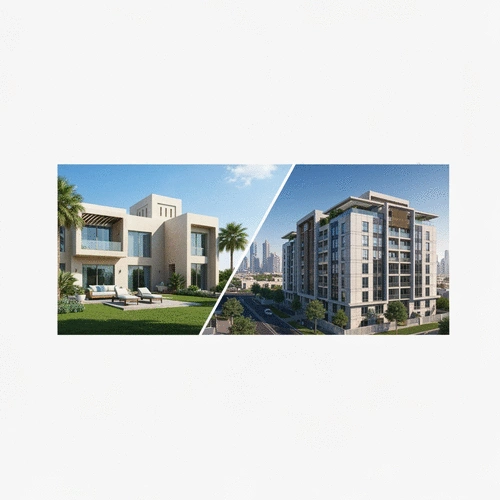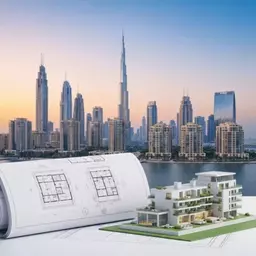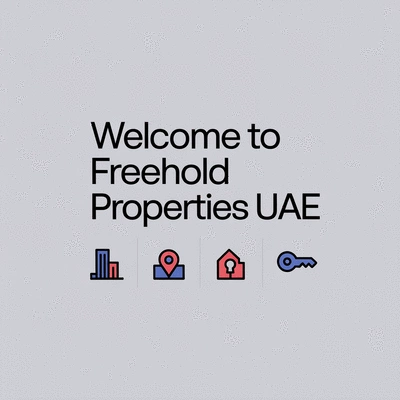Considering investing in the UAE property market? The differences between freehold and leasehold properties can significantly impact your investment strategy and lifestyle choices.
What You Will Learn
- Freehold properties provide complete ownership, including the building and the land, offering greater control and investment potential.
- Leasehold properties involve renting the land, typically for a fixed term of up to 99 years, with limitations on modifications and ongoing costs like ground rent.
- Understanding the legal implications can influence your investment decisions; freehold owners enjoy full rights, whereas leaseholders must adhere to the landlord's terms.
- Freehold properties often come with easier access to residency visas, a significant advantage for international buyers wishing to stay long-term in the UAE.
- Financially, freehold properties require a higher initial investment but can lead to greater long-term value compared to leasehold options, which may have lower upfront costs but ongoing obligations.
Freehold vs Leasehold Properties in the UAE: A Comparative Overview
This visual highlights the key distinctions between freehold and leasehold property ownership in the UAE, offering a side-by-side comparison of their main characteristics.
Key Aspects of Property Ownership
1. Ownership Duration
2. Modification Rights
3. Investment Value
4. Residency Visa
Understanding Property Ownership in the UAE: Freehold vs Leasehold
As a seasoned real estate expert in the UAE, I often encounter questions about the two primary types of property ownership: freehold and leasehold. Understanding these distinctions is crucial for anyone looking to invest in the vibrant UAE property market. Let’s break it down.
What Are Freehold Properties in the UAE?
Freehold properties represent the highest form of ownership available in the UAE. When you purchase a freehold property, you own both the building and the land it sits on outright. This means you have the right to use, modify, and sell the property without needing to seek permission from a landlord or governing body. This type of ownership is particularly attractive to both local and international buyers, as it grants complete control over the property. The Dubai Land Department provides services to inquire about property ownership, ensuring transparency for investors.

Moreover, owning a freehold property often comes with additional benefits, such as easier access to residency visas. When you invest in freehold property, you're not just acquiring a home; you're stepping into a world of opportunities that can enhance your lifestyle and investment portfolio.
- Fully owned land and property without restrictions
- Increased freedom to renovate and manage your space
- Eligibility for residency visa options under certain conditions
These advantages make freehold properties a popular choice among buyers eager to establish roots in the UAE.
What Are Leasehold Properties in the UAE?
Leasehold properties, on the other hand, operate on a different framework. When you buy a leasehold property, you are essentially renting the land on which your property is built. Typically, the lease term can vary but is often around 99 years. During this period, you have the rights to live in and utilize the property as per the lease agreement, but ownership of the land remains with the lessor.
Leaseholders face specific limitations, such as not being able to make significant alterations to the property without prior approval. Additionally, there may be annual ground rents payable to the landlord, which can impact the overall cost of ownership. The Abu Dhabi Real Estate Market Report offers insights into market trends that can influence leasehold property values and terms.
- Limited ownership duration with fixed lease terms
- Obligations to pay ground rent yearly
- Restrictions on alterations and subletting
Understanding these aspects is essential for anyone considering a leasehold investment in the UAE market.
Key Comparisons Between Freehold and Leasehold Properties
Ownership Rights and Legal Implications
The legal framework surrounding freehold and leasehold properties varies significantly. Freehold owners enjoy complete property rights, allowing them to make decisions independently. In contrast, leaseholders must comply with the terms set by the landlord. These differences can directly influence your investment strategy and personal living experience in the UAE. For a comprehensive overview of the investment climate, including real estate regulations, refer to the 2023 Investment Climate Statements for the UAE.
As you weigh your options, reflecting on these legal distinctions is imperative for making informed decisions that align with your goals.
Financial Aspects: Costs and Investment Value
When it comes to the financial implications of freehold versus leasehold properties, there are several factors to consider. Freehold properties generally require a higher initial investment, but they can offer more significant long-term value due to their unrestricted ownership. In contrast, leasehold properties may have lower purchase prices, but they involve ongoing costs like ground rent and potential fees for lease renewals.
- Freehold: Higher upfront costs but greater investment potential
- Leasehold: Lower initial costs with ongoing financial obligations
- Maintenance costs may vary based on property type and location
Evaluating these financial aspects will help you determine which property type suits your budget and investment goals.
Impact on Residency Visa Eligibility
Another critical factor to consider is how property ownership type can affect residency visa eligibility in the UAE. Freehold property owners may find it easier to obtain residency visas, as the UAE government encourages foreign investment in freehold properties. This can be a significant advantage for international buyers looking to make the UAE their home.
On the other hand, leaseholders may face stricter requirements regarding residency, as their ownership structure does not guarantee long-term stability. Understanding these implications can aid in your decision-making process when choosing a property.
Pro Tip
When considering property ownership in the UAE, take the time to assess your long-term goals. Freehold properties can provide greater financial security and investment potential, making them an ideal choice for those looking to establish a permanent residence. However, if flexibility and lower initial costs are your priorities, leasehold properties may suit your needs better. Always consult with a knowledgeable real estate professional to tailor your investment strategy to your personal circumstances.
Frequently Asked Questions about Property Ownership in the UAE
Many potential buyers have questions about property ownership in the UAE. Here are some common queries:
- What is the primary difference between freehold and leasehold properties in the UAE? Freehold properties offer complete ownership of both the building and the land indefinitely, while leasehold properties involve renting the land for a fixed term (typically up to 99 years), with the land ownership remaining with the lessor.
- Do freehold properties offer greater investment potential than leasehold ones? Yes, freehold properties generally have higher investment potential due to unrestricted ownership and the ability to make modifications, often leading to better long-term value. Leasehold property value is more dependent on the remaining lease term and associated conditions.
- How does property ownership affect eligibility for a residency visa in the UAE? Freehold property owners often find it easier to obtain residency visas, as the UAE government encourages foreign investment in freehold properties. Leasehold ownership may come with stricter requirements for residency due to its limited duration.
- Are there restrictions on modifying leasehold properties? Yes, leasehold properties usually have restrictions on significant modifications, requiring prior approval from the landlord. Freehold property owners typically have complete freedom to modify their property.
- What are the ongoing costs associated with leasehold properties? Leasehold properties often involve ongoing costs such as annual ground rent payable to the landlord, in addition to potential fees for lease renewals. Freehold properties generally do not have these specific ongoing land-related costs.
Understanding Property Taxes and Legal Obligations
Finally, it’s essential to navigate the property tax landscape in the UAE. Freehold properties may incur different tax obligations compared to leasehold properties. While the UAE is known for its favorable tax environment, being aware of any applicable fees and legal responsibilities is crucial for both ownership types.
- Freehold properties typically enjoy fewer tax liabilities
- Leaseholders may face specific obligations tied to the lease agreement
- Staying informed about local regulations is key to compliance
By understanding these elements, you can make informed choices that align with your financial strategy.

Summarizing Your Property Ownership Choices in the UAE
Understanding the differences between freehold and leasehold properties is crucial for making informed decisions about real estate investments in the UAE. Freehold properties offer complete ownership, allowing you to enjoy full rights over the property, including the ability to modify and sell it as you wish. In contrast, leasehold properties provide limited rights, typically for a fixed term, which means you need to adhere to certain restrictions set by the property owner.
When deciding between these two options, consider factors such as your long-term investment goals, lifestyle preferences, and the impact of ownership type on residency. The flexibility of freehold properties often appeals to many buyers, while some may find leasehold properties an accessible entry point into the UAE real estate market.
Your Next Steps in Property Investment
Now that you have a clearer picture of property ownership types in the UAE, it's time to evaluate your options. Are you leaning towards a freehold property for its freedom and investment potential, or does a leasehold property suit your current needs? Whatever your choice, I encourage you to consult with real estate professionals who can provide tailored advice and guide you through the process.
At Freehold Properties UAE, we pride ourselves on offering expert guidance tailored to your unique situation. Our team is ready to help you navigate the dynamic property landscape in the UAE, ensuring that you find the perfect match for your investment goals!
Visual Comparison of Freehold vs Leasehold Properties
For a quick reference, here's a comparison table summarizing the key differences between freehold and leasehold properties:
| Aspect | Freehold Properties | Leasehold Properties |
|---|---|---|
| Ownership Duration | Indefinite ownership | Fixed term (usually 99 years) |
| Modification Rights | Complete freedom to modify | Restrictions apply on modifications |
| Investment Value | Higher potential returns | Dependent on lease terms |
| Residency Visa | Eligibility for residency visa | Limited residency options |
This table provides a concise overview to help you weigh your options more effectively.
Understanding the Role of Property Brokers in Your Investment Journey
As you embark on your property investment journey, it’s essential to recognize the pivotal role that property brokers play in the process. Brokers can simplify your search for the right property by providing access to extensive listings and local market insights. They are equipped to negotiate the best deals on your behalf and ensure you navigate legal requirements smoothly.
At Freehold Properties UAE, our team of experienced brokers is dedicated to helping you find the property that meets your needs and dreams. Whether you’re a first-time buyer or a seasoned investor, we are here to support you every step of the way!
Recap of Key Points
Here is a quick recap of the important points discussed in the article:
- Freehold properties offer complete ownership, allowing for renovations and modifications without landlord approval.
- Leasehold properties come with restrictions and limited ownership duration, typically around 99 years.
- Understanding financial aspects is vital; freehold properties generally require a higher initial investment but offer greater long-term value.
- Freehold ownership can facilitate easier access to residency visas, whereas leasehold ownership may impose stricter residency conditions.
- Awareness of property taxes and legal obligations is important, as freehold properties usually have fewer tax liabilities compared to leasehold properties.









